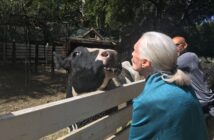An update from our 2023 annual report.
Before she was a global icon, before she was a scientist, Dr. Jane Goodall was first and foremost a lover of animals. Her belief in the sentience and sapience of non-human animals — including one of her greatest teachers, a dog named Rusty — motivated her passions from a young age. The Jane Goodall Institute is proud to continue in this spirit through our work today. Chimpanzees are our flagship species — their status in the wild guides our investments, and we support the entire tapestry of life that makes up their ecosystem.
News From Tchimpounga’s Chimpanzees
JGI’s Tchimpounga sanctuary in the Republic of the Congo was founded in 1992 to rescue and rehabilitate chimpanzees injured and/or orphaned in the illegal wildlife trade. Since then, Tchimpounga has expanded their care work to other species, but we still love checking in with the chimpanzees. From new babies to changes in power, a lot has happened at Tchimpounga in 2023!

Tchimpounga’s newest moms: Wild chimpanzees Molly and Leia both gave birth to healthy babies, and Tchimpounga’s Lucie gave birth to twins!
New sanctuary arrival: Kevin was brought to Tchimpounga from northern Republic of the Congo, and staff member Francine provided around-the-clock care until they could introduce him to another young chimpanzee, Walter.


New relationships brewing: Jeje has been building his nest near two females, Nzounzou and Zimbana, while Wounda’s daughter Hope has been spending a lot of time with a male chimpanzee named Zola.
Power struggles on Tchindzoulou Island: As Kefan has gotten older, he has chosen to partner with male chimpanzee Tchibanga, though now they’re starting to face some competition from other males, as is a natural and integral part of a thriving chimpanzee community.

A Multi-species Tapestry
Chimpanzees will always hold a special place in JGI hearts, and we know that to secure their future, we must invest in a world where all species thrive. The image Dr. Jane Goodall often paints of biodiversity as a tapestry of life guides our work — caring for not only chimpanzees, but also other wildlife in chimpanzee habitats. In response to an increased number and variety of confiscated species, the Tchimpounga sanctuary has adapted to provide rehabilitative care to other animals in addition to chimpanzees. Some of the wildlife rescues that joined Tchimpounga in 2023 include:
- 31 monkeys (including mandrills and chlorocebus monkeys)
- 45 African gray parrots
- 24 tree pangolins
- 11 Turtles and tortoises
- 9 dwarf alligators
- 2 red river hogs
- 2 blue duikers
- 2 side-Striped Jackals
- 1 African fish eagle





Tackling Wildlife Trafficking
Wildlife rehabilitation is just one piece of our conservation work in the Republic of the Congo. For over a decade, JGI has innovated and created what is called the “triangle approach.” This works on three sides: partnership with law enforcement, best-in-class welfare practices, and education among local communities. As part of the law enforcement side of this triangle, JGI’s trained rangers maintain the Tchimpounga Nature Reserve’s border with regular patrols and checkpoints, including trained sniffer dogs.

JGI’s Canine Detection Unit plays a vital role in safeguarding wildlife and habitats. These highly trained dogs and their handlers serve as a formidable deterrent to illegal activities. The dogs’ acute sense of smell and tracking abilities enable them to detect hidden contraband, firearms, and even illegal hunters in dense forests. In 2023, the Canine Detection Unit was introduced to a new scent: the gray parrot, an increasingly exploited species often transported in closed containers. Our trainers continually expand the unit’s toolkit to keep pace with emerging species targeted by illegal trafficking operations, ensuring JGI’s team is always prepared to protect wildlife in danger.
Cross-Border Partnership Drives Chimpanzee Rescues
A meaningful collaboration between JGI and our partner Wild at Life led to the 🔗 transfer of four additional chimpanzees from Angola to the Tchimpounga sanctuary. This followed a successful 🔗 transfer in 2022 with eight chimpanzees coming from Angola, and now all 12 of these chimpanzees are thriving!
The Republic of Angola has become a focal point in recent chimpanzee rescue efforts. While the Angolan government has developed a temporary facility, they do not have experienced veterinary and caregiving staff. Without any chimpanzee sanctuaries in Angola, JGI is the only organization in proximity to Angola with the means and experience to help provide the necessary care to their rescued chimpanzees. Our collective efforts are exemplifying the transformative impact that pave the way to a safe, supportive environment in which every animal can thrive.
We have so many more stories to tell from this year! Explore our full 🔗 2023 annual report PDF to learn about our Chimpanzee Welfare Index, meet one retired sniffer dog, get details on some of our Tchimpounga rescues, and read about our reintroduction of a group of mandrills to protected, natural habitat.
Photo credit: JGI/Fernando Turmo










